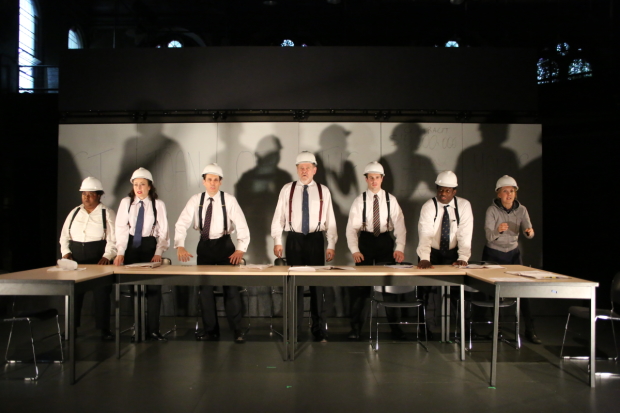Saint Joan of the Stockyards

(© Gerry Goodstein)
One might not suspect that an 85-year-old play about fluctuations in the Chicago meat market would have much to do with modern America, but one would be wrong. The Irondale Ensemble proves this in their clever and watchable revival of Bertolt Brecht's Saint Joan of the Stockyards, now playing at the company's performance space in Brooklyn. Revered German director Peter Kleinert helms the production, which is simultaneously nimble and hard-hitting in its indictment of neoliberal capitalism. Even those who deem themselves "not a Brecht person" will probably reconsider this position after seeing Saint Joan.
Pierpont Mauler (Joey Collins) is the king of the Chicago meatpackers. But with market speculation rampant, he decides to get out while he still can. He proposes to sell his shares to his business partner Cridle (Terry Greiss), but Cridle won't bite until Mauler drives rival meatpacker Lennox (Sam Metzger) out of the market. Meanwhile, fellow factory owner Graham (a very funny Michael-David Gordon) looks to see where he can exploit market trends and legislative whimsy to become the new top dog.
While these four men play their meaty game of thrones, thousands of workers suffer through hunger and cold in the stockyards. They survive the volatile cycles of capitalism only through the grace of Joan Dark (Erika Strasburg) and the Black Straw Hats, a Salvation Army-like group that offers the word of God with a bowl of hot soup. After Mauler's unscrupulous broker Slift (a creepily manic Celeste Ciulla) takes Joan on a disturbing tour of the slaughterhouse, she begins to suspect that her efforts are just a stopgap measure. In fact, they might even be propping up an exploitative status quo.
Brecht wrote Saint Joan of the Stockyards in 1930, when his Marxism was still in its nascence. Its heady mix of numbers and rhetoric has the potential to be a painfully boring theatrical experience — like listening to a college sophomore scream about Das Kapital.
Thankfully, Kleinert uses Paul Schmidt's muted translation (written in the aftermath of the breakup of the Soviet Union) to great effect. It draws out the themes Brecht sought to address without dwelling on his ideological blind spots. (In Weimar Germany, Communism certainly looked like a better option than Nazism. How could he have known?) This is Brecht for the Thomas Piketty era.
Kleinert makes an irrefutable case for the continued relevance of the play. A passage relating the death of a factory worker named Luckerniddle, who is killed when he falls into a bacon maker (an allusion to Upton Sinclair's The Jungle), has often been dismissed as leftist sensationalism. Kleinert lets us know that it is nothing of the sort by having Strasburg read aloud from a news report about the April indictment of two managers at Bumble Bee Foods whose negligence caused factory worker Jose Melena to be cooked alive in 12,000 pounds of canned tuna. Sadly, industrial accidents driven by the constant push for higher productivity are not yet a thing of the past. Saint Joan is indisputably of our time.
The performances also support this. As the crusading Joan, Strasburg has subtly adopted the mannerisms and cadence of Senator Elizabeth Warren, her appeals to common sense and fairness uncanny. The ever-cool Collins is more like Frank Underwood, the smooth political operator from House of Cards. We know he's a money-grubbing industrialist, but we (like Joan) can't help but submit to his charms and classically handsome good looks. He and his fellow meatpackers (they prefer "job creators") participate in a panel discussion with the audience, flanked by photos of Donald Trump and Carly Fiorina. This is followed by the presentation of a large donation to the Black Straw Hats, a dig at the complicity of charities in the malfeasance of their wealthy benefactors. Audience members are invited to take selfies with the giant prop check.
Kleinert endows the production with a healthy dose of levity, despite the seriousness of the depressing subject. You'd cry if you could only stop laughing. Ken Rothchild's versatile set of sliding dry erase boards offers the perfect platform for Kleinert's light-footed staging. It also allows the players to literally write-out Brecht's deluge of numbers before us, illuminating the lengthy commodity-trading sessions. Human beat box Paul Koudouris underscores the two-hour event, impressively playing several instruments and creating all the sound effects.
Even the most die-hard capitalist will have a hard time walking away from this production without a smile on his face and a song in his heart. This is how you do Brecht.











